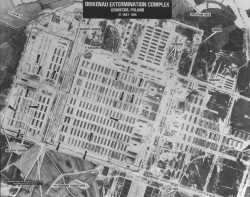>>17466415>>17466425>>17466690There were a number of options, but each one of them had their own set of problems.
>put diplomatic pressure on Germany to halt itAdmirable, but unlikely to work in the context of a total war.
>conventional bombing of railway lines leading to the extermination campsWas unironically extremely ineffective because the Germans got VERY good at repairing damaged railway lines in a jiffy.
>conventional bombing of the extermination camps themselves to knock them out of commission for goodWasn't even possible for the duration of Aktion Reinhard (the most lethal phase of the Holocaust) because Central Poland was out of range of Allied aircraft, which had to both fly to their targets and then make the trip back to Great Britain. Auschwitz only came within range of the longest-ranged Allied bombers (B-17s and B-24s) in April, 1944. By that point, all of the other extermination camps (Chelmno, Treblinka, Sobibor, etc.) had since closed due to a lack of victims or riots started by the prisoners and D-Day was a mere two months away, meaning that weren't large numbers of Allied aircraft available to be diverted at all and this high tempo of operations was kept up for remainder of the war.
Then, there's the question of effectiveness. This wasn't the age where I could put a 2,000lb JDAM into someone's window with a three foot margin of error. You had to drop a lot of bombs and the Luftwaffe still maintaining air superiority over Eastern Europe meant you had to do it from high altitude. You could have had 100 B-17s hit the camp, kill massive numbers of prisoners, and completely miss the gas chambers. We know this because many of the concentration camps within Germany itself WERE bombed and this was the exact outcome.
cont.

